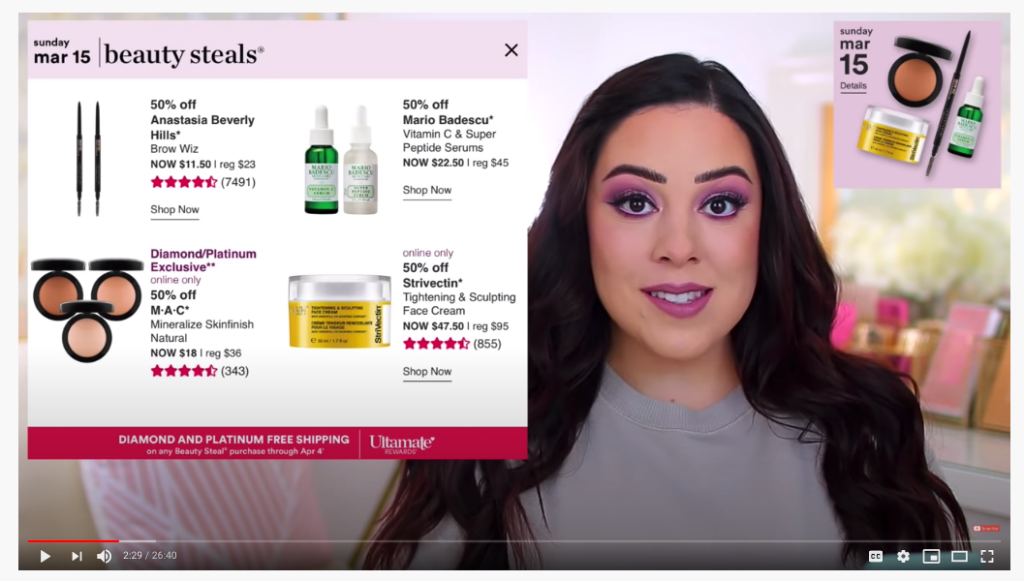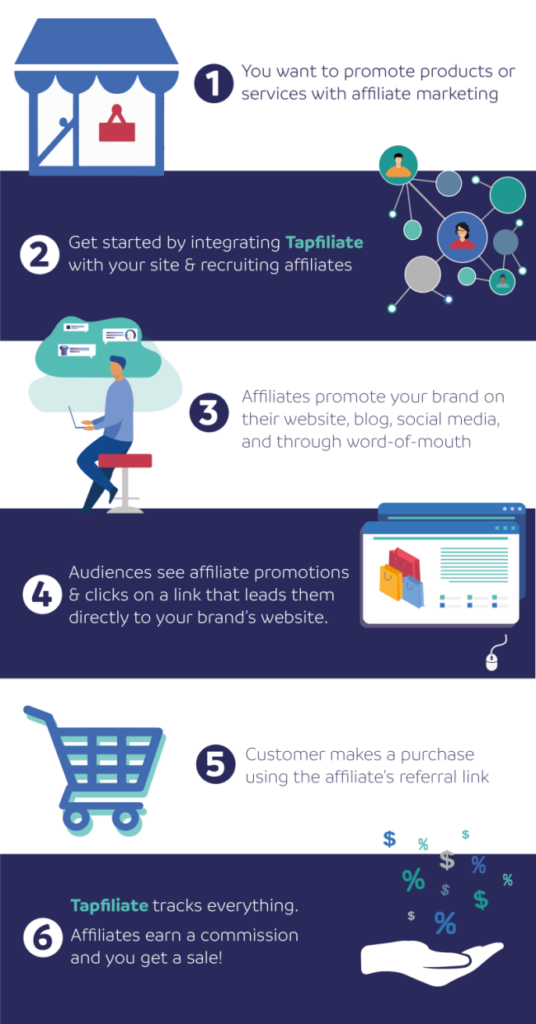Affiliate Marketing
eCommerce
Affiliate Marketing
eCommerce

The online market is a busy and crowded place. And it’s growing in popularity, with more and more businesses taking their stores online.
So the challenge is, how do you make your business stand out?
Between SEO, paid advertisements, display banners, email campaigns, and social media — there are a lot of options available. However, each has limitations and costs.
For e-commerce sites looking for a new marketing channel, there’s affiliate marketing.
Affiliate marketing has become an increasingly popular marketing strategy for e-commerce sites looking to scale and grow. This is a way to leverage the power of word-of-mouth marketing to generate leads, reach targeted audiences, and increase conversions.
As a growth strategy, affiliate marketing has proven to be effective. In fact:
So whether you’re a local brick-and-mortar business beginning an e-commerce site or a large retailer established in the marketplace, affiliate marketing is a worthwhile strategy. In this article, we’ll cover what affiliate marketing is, how to get started, and examples of successful affiliate promotions.
Affiliate marketing incentives individuals (affiliates) to promote your business and refer customers. In exchange for their promotions, affiliates earn a commission for every successful referral.
For e-commerce, this is typically when a referral makes a purchase.
Let’s use the beauty industry as an example of how affiliate marketing works:
A brand selling skincare products starts an affiliate program to promote its products.
They partner with beauty vloggers to become affiliates for their brand. These affiliates create video content featuring different skincare routines using the brand’s products and include a link to the e-commerce site where everything from in their video can be purchased.
Whenever someone uses this link and completes a purchase, the affiliate is paid a commission.

Affiliate marketing is a robust solution for almost all e-commerce businesses. It’s suited for those just starting out, as well as for those more established businesses looking for an additional channel to add to their existing marketing stack.
Here are the key benefits of affiliate marketing for e-commerce.
Whether it be an influencer with hundreds of followers or a happy customer sharing with their family and friends, affiliates provide built-in audiences that they can promote your e-commerce business to.
Affiliate marketing is an opportunity to reach new customers and build brand awareness.
It’s also a way to introduce your business to people who don’t even know you exist. If you only use AdWords for marketing, your ads will only show to audiences already searching for related products. However using affiliate marketing, ads can be shared across a variety of platforms, reaching widespread audiences so that customers can become familiar with your business — such as someone just scrolling through their Facebook feed.
Hubspot found that 75% of people don’t believe adverts. But 90% trust suggestions from family and friends, and 70% trust consumer reviews.
Affiliate promotions can be far more powerful than traditional advertising, with unique content like blog posts, reviews & testimonials, videos, infographics, and word-of-mouth recommendations.
This content uses social proof to build trust and credibility around your business, and influence customer buying decisions.
The rising costs of PPC campaigns on AdWords and Facebook makes it hard for e-commerce businesses, particularly those just starting out, to compete with major corporate retailers.
Affiliate marketing is a cost-effective way to promote your business online.
With a pay-for-performance model, you only pay for ads that convert into sales. It’s a low-risk investment with a clear ROI so marketing budgets won’t be wasted on ad campaigns that aren’t successful in converting customers.
A majority of businesses say generating traffic and leads is their biggest marketing challenge.
Affiliates are one way for e-commerce businesses to generate more online traffic, with 71% of marketers rating the quality of customers and traffic from affiliate marketing as better than other marketing sources.
Partner with affiliates in your niche to bring in even more targeted traffic. For example, a sportswear ecommerce site would want to partner with fitness influencers or healthy-eating blogs who share audiences with related interests.
Affiliate marketing is very measurable, as you know exactly where your customer came from.
Having this insight, you’ll know right away what is working and what is not. Customer referrals might convert better than influencer promo codes. Maybe you find there’s a whole geographical location you’ve been missing out on. Or affiliates that use video are more successful in promoting.
With Tapfiliate’s reporting, you’ll have access to all performance data. This way you can adjust accordingly, such as creating more engaging marketing materials for affiliates or setting higher commissions to further incentivize top performers.

Want to start an affiliate program? Try all the features: get a 14-day free trial here
Start with Tapfiliate’s integrations.
Here you’ll find integrations for top e-commerce platforms like WordPress, Shopify, Magento, WooCommerce, PayPal, Stripe, etc.
For most e-commerce platforms, this process is pretty seamless so you can get started in just minutes. There’s also a manual integration option available for custom-made sites.
After you set up your integration, it’s time to customize your affiliate program.
Much like your other marketing efforts, you’ll want everything to match your business. You wouldn’t use different branding in your ads or social media pages, and the same goes for your affiliate program.
Customize your program with the following:
What will affiliates earn for promoting your business?
There are two things to consider when it comes to setting affiliate commissions. First, what will affiliates earn a commission for? Second, how much commission will they earn?
Conversions
What affiliates earn a commission for will vary depending on your overall marketing goals. Are you seeking to solely build brand awareness? Generating leads? Increasing revenue?
This action is referred to as a conversion. For e-commerce, this is generally when a referral makes a purchase.
Commission
For every conversion they generate, affiliates will earn a commission.
Commission amounts can be a flat rate or a % of the sale. This is typically a 1-time commission.
However, you can also offer recurring commissions for certain conversions, such as subscription-based products. With recurring commissions, affiliates earn a commission for each successful payment their referral makes. For example, if their referral pays for a monthly subscription box, the affiliate would earn a commission every month they pay. This can be capped, for example at 6-months or when the commissions hit a certain limit amount.
Additionally, you can offer commission tiers and bonus schemes as a way to attract top promoters and further incentivize affiliates.
Then, it’s time to start finding affiliates to promote your e-commerce products.
A great starting point is always your customers.
With Tapfiliate’s Affiliate Recruitment feature, you can directly invite your new and existing customers. This will automatically send your customers a referral link that they can use to promote your site to others. When they refer a new customer they are immediately added to your affiliate program, and will be invited to log in to view their performance and find more of your program’s resources.
Other great affiliates for e-commerce include:

For example, well-known beauty bloggers often promote cosmetic retailer Ulta’s 21 Days of Beauty with videos and blogs. They include makeup tutorials and cover what to buy, reviews, and referral links to the products. Not only do they give the brand a stamp of approval, the content is unique and engaging.
You can customize your program to decide who joins your affiliate program. It can be invite-only, offered only to your existing customers, or open to everyone.
Some sites choose to be invite-only so they have more control of their brand and know where and how they are being promoted. Other sites choose to open their affiliate program to everyone so they can be promoted as much as possible.

After following the steps above, you’ll be ready to start affiliate marketing for your e-commerce business. Here are a few more strategies to help make your program successful.
Routinely check in with affiliates to make sure they have everything they need to promote. This can include having a welcome message, drip campaigns, monthly newsletters, and an annual survey.
Updating affiliates is especially important for e-commerce. Keep affiliates updated on new product launches, any awards or media mentions you have received, and any time-sensitive content.
It’s also likely that you’ll have sales and discount periods, such as the holiday season. Be sure to provide affiliates with all the important details, including:
The earlier you can provide this information, the better. By giving your affiliates advanced notice of these specific sales, they will have plenty of time to prepare content like in-depth product reviews, sales guides, or tutorial videos.
Additionally, affiliates can be an “insider source” for your site’s sales, giving their audiences details or promo codes prior to the sale beginning.

Provide great marketing materials for affiliates to promote. This includes banners, images, text links, social media posts, and video.
It’s also helpful to provide your branding. A branding kit will ensure that affiliate promotions are consistent and recognizable to audiences. This includes your brand’s logos, color profiles, typography, slogans, company images etc.
Additional useful materials include awards, rankings, media mentions or endorsements.
As affiliate marketing becomes increasingly popular for e-commerce promotions, you’ll want to make sure you stay competitive. Stay on top of industry trends and competitor offers, like you would any other marketing effort.
Also, consider ways that can make your affiliate program stand out to potential affiliate partners. This can include offering bonus schemes to incentivize affiliates or higher commissions for top-tier influencers.
This covers everything you need to know to start affiliate marketing for your e-commerce business.
Then, it’s up to you what you’d like your affiliate program to look like. You can take a more hands-on approach by actively recruiting affiliates and running contests. You can also choose to use automation tools to take care of certain tasks and streamline workflows.
If you’re ready to get started, you can sign up for a Free 14-day trial with Tapfiliate here.

Want to start an affiliate program? Try all the features: ?get a 14-day free trial here

Jessica Rangel
Spending my days writing marketing content, cycling around canals in Amsterdam, and attempting to master the Dutch language.